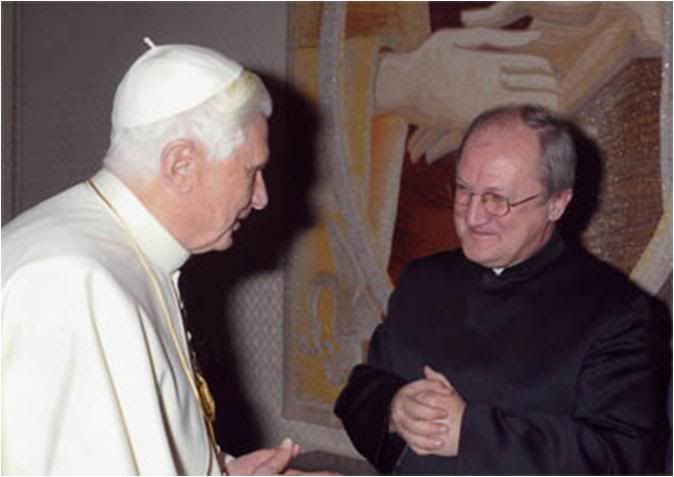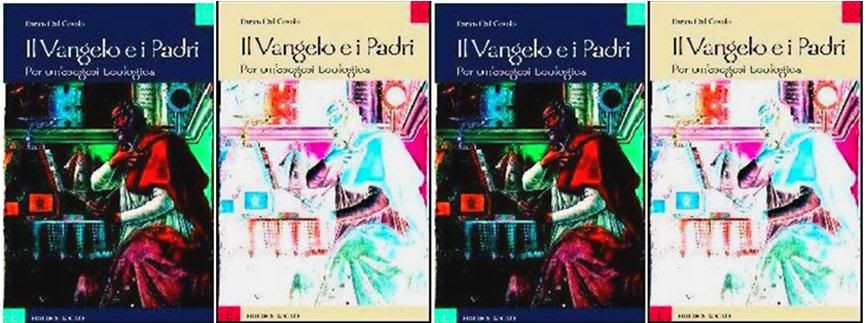 Salesian Fr. Enrico Del Covolo was named by the Holy Father Wednesday to be the new Rector Magnificus of the Pontifical Lateran University - the 'Pope's university' since it is attached to the Cathedral of the Bishop of Rome.
Salesian Fr. Enrico Del Covolo was named by the Holy Father Wednesday to be the new Rector Magnificus of the Pontifical Lateran University - the 'Pope's university' since it is attached to the Cathedral of the Bishop of Rome.

A few days earlier, Del Covolo came out with a new book about the exegetical aspect of Benedict XVI's Magisterium - his interpretation of Scripture. Gianni Cardinale interviewed the author for Avvenire.
Joseph Ratzinger's critique
of Biblical exegesis done
without 'the eyes of faith'
Interview by
Gianni Cardinale
Translated from

June 29, 2010
A characteristic concern of Benedict XVI"s Magisterium has been to find an approach to the Bible that recomposes the "devastating gap between exegesis and theology" through the method of 'canonical' as well as 'theological' exegesis.
To illustrate this dimension of Ratzingerian teaching even to regular folk, a dexterous book has just come out by Salesian Fr. Enrico Dal Covolo, professor of ancient Christian literature and consultor to the Congregation for the Doctrine of the Faith.

The book by the man whom Benedict XVI asked this year to preach the Lenten spiritual exercises for the Roman Curia is entitled
Il Vangelo e i Padri. Per un’esegesi teologica (The Gospel and the Fathers: towards a theological exegesis) (Rogate, pp. 190, euro 16).
"With his JESUS OF NAZARETH," Del Covolo writes, Joseph Ratzinger-Benedict XVI marked a decisive stage in this urgent itinerary of
'uniting exegesis and theology'. The original intention of the Pope's book, was in fact to integrate the historico-critical method - which is praiseworthy, indispensable, but insufficient by itself - with some new criteria matured in the last two decades in various Catholic circles of theological-biblical research".
What are these 'new criteria' identified by the Pope?
First of all, a substantial trust in the historical reliability of data in the New Testament, in contrast to the academic methodology. Thus, a robust affirmation of the unity and continuity between the Old and New Testaments.
Then, a more 'ecclesial' hermeneutic (interpretative key) that is obedient to the living Tradition of the Church and the magisterium of her Fathers, considered as the primary interpreters of Scripture.
Finally, being more attentive to the so-called
analogia fidei, namely the internal consonances and reciprocal correspondences among the various facts of the faith.
In short, no passage of Scripture can be correctly interpreted when one does away with its vital context, which is established by the faith of the Church, faith in Jesus Christ, the only Savior of the world.
This 'new method' - which the Pope calls 'canonical exegesis' - has allowed him to present the Jesus of the Gospels as the real Jesus, the 'historical' Jesus. So there is no longer a gap between Jesus of Nazareth and the Christ of faith: there is just one and very real Jesus Christ, who is the Son of God incarnated for our salvation.
[COLORE=#FF1601In your book, you explain how Benedict XVI has gone ven deeper into this course of "unity between exegesis and theology" with his intervention at the general congregation on October 14, 2008 at the Bishops' synod dedicated to the Word of God. In what sense?
On closer look, that intervention introduced an important element of 'newness ' regarding Jesus of Nazareth. The Pope assumes the 'new criteria' of 'canonical exegesis' to establish and propose a true 'theological exegesis'.
In that context, Benedict XVI reminded us that one can speak of theological exegesis only where the two methods - historico-critical and theological - are observed, an exegesis that is appropriate and adequate to Sacred Scripture.
But, he added "while current academic exegesis has been working at a very high level on the first method and has really been helpful, one cannot say the same for the theological method. And this has rather serious consequences".
What are those consequences?
The most serious is without a doubt the gap between so-called 'scientific or academic exegesis' and
lectio divina, which is based on the 'spiritual or allegorical exegesis' of the Fathers.
In turn, this gap finds its roots in a now millenary reciprocal indifference between 'rational theology' espoused by those who claim to know everything by their own powers, and 'monastic theology' or 'theology on one's knees', in which true knowledge of God comes through the contemplative experience of his love.
What is the remedy?
A renewed approach to Scriptures such as Benedict XVI tells us, which makes urgent some return to the Fathers in matters of Biblical exegesis. But certainly not an acritical and anti-historical return that could compromise the conspicuous advances made in Biblical science, thanks lately to the use of the historico-critical method.
But it means, as the Pope himself suggested, a return to the Father5s that is capable of taking on "the new methods, carefully considered" such as a
lectio divina that is in step with the times. This is the challenge that I wished to confront in this book.
The word is not mentioned at all in this interview but this 'return to the Fathers' - known by the French term 'ressourcement', or going back to the sources - is an important concept in the hermeneutic of continuity of Vatican II and was a guiding principle for the Council theologians like De Lubac, Congar and Ratzinger who saw the Council as 'a renewal in continuity with Tradition'.
[Modificato da TERESA BENEDETTA 01/07/2010 14:20]